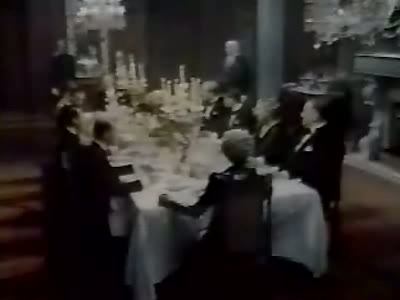Réalisation:
Luchino ViscontiMusique:
Maurice JarreActeurs·trices:
Dirk Bogarde, Ingrid Thulin, Helmut Griem, Helmut Berger, Umberto Orsini, Reinhard Kolldehoff, Florinda Bolkan, Nora Ricci, Charlotte Rampling (plus)Résumés(1)
Allemagne, 1937. Le baron Joachim von Essenbeck donne une réception dans son luxueux manoir. Pour l’occasion, toute la famille est réunie, dont la baronne, leurs enfants ainsi que le directeur des usines de von Essenbeck. Au cours de la soirée, ils apprennent que le Reichstag de Berlin vient d’être incendié et que les nazis ont pris le pouvoir. Loin de les épouvanter, la nouvelle est l’occasion pour chacun des membres (ou presque) de céder à ses pulsions de pouvoir, de séduction et de mort. La dynastie sombre alors dans une morbide décadence rouge et noire. (LaCinetek)
(plus)Critiques (2)
Another elaborate return to the past by Visconti, where he assists in the decline of the old elites - this time capturing the decay of the wealthy Essenbeck family, German industrialists, who succumb to the dark force of victorious fascism during the years 1933-34. After the removal of the head of the family and the escape of his antifascist successor into exile, the remaining family members are driven by the desire for power and wealth, becoming easy prey for the manipulator and whisperer, SS officer Aschenbach, as a symbol of the new order. Unfortunately, just like elsewhere, Visconti allows himself to be carried away by the depiction of decadence and his favorite sexual deviations at the expense of the persuasiveness of his characters and the story. Where famous Czechoslovak films on the same subject, The Cremator and The Shop on Main Street, are disturbing and exceptionally powerful because they stem from a deep understanding of the conditions at that time and the understanding of historical processes, Visconti manages to create an absolutely gaudy and forcedly colorful poster that appears artificial. Aschenbach's disruptive demonic effort seriously makes no sense, he could easily charm an old man as well, and the German Chancellor had an exceptionally favorable relationship with the big industrialists, as both sides needed and complemented each other. Yes, Röhm was a homosexual, but it significantly weakened his position of power and certainly did not mean that the meeting of the SA leadership turned into a homosexual orgy. The atmosphere that Visconti wanted to associate with Hitler's regime could be found much more in the cabarets and luxury brothels of the Weimar Republic. On the contrary, for Nazism, the typical call was for a return to old virtues, and with a few exceptions, such as Göring's hedonism and Goebbels' womanizing, Nazi leaders acted as exemplary petit bourgeois, and that's how Nazi ideology appeared as well. Visconti's parade of decadence, animal instincts, and twisted characters did not generate sympathy in me, but on the other hand, the director had mastery over his craft, utilized quality actors, and did not bore me. It didn't make me angry enough to give it a rating lower than three stars, even though it would have appealed to me much more without the elements of theatricality and pathos. Overall impression: 55%.
()
A fascinating panopticon in its own way, initiated by a chess player who thought he would lay out his own treatise on the rotten German elite at the turn of the Weimar miracle and the rise of the Third Reich. It's almost unbelievable how realistic all the sets, makeup, and costumes are. This is all more perfect than the usual retro of that time period in any genre. Unfortunately, there are some cracks in there too. For example, using Zarah Leander's hit as a soundtrack is a bit premature, because her fame spread in the German-speaking world only after 1937... Marlene Dietrich's caricature is more temporally adjacent, but this caricature went beyond artistic rape and is more disgusting than anything Fassbinder ever touched. It's too bad that the little that is of quality here goes to waste amidst all the would-be fusion with the culture and politics of the time, the wasteful use of formal devices, the playing with color filters and, of course, the ancient tragedy itself, into which this originally subtle tinkering with loose morals has grown. If it was supposed to be about realism, Visconti should have woken up and forgotten about the absurd mixture of Italian and German and made the whole film entirely in German. Also, it is too naive to cement in one person the desire for exhibitionism, gender confusion, pedophilia, the oedipal complex, and incest. This extraordinary indictment alone would be enough for a stand-alone film if the subject matter were as strong and as fundamentally true as Visconti tries to make us believe. Personally, the only positive things are the realistic production design and the debut of child actress Irina Wanka (as the victim Lisa), who, at only eight years old has become her famous father’s successor.
()

